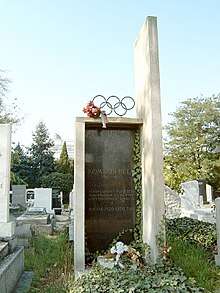Béla Komjádi
Béla Komjádi (15 March 1892 – 5 March 1933; known as Béla Bácsi (Uncle Béla) by his players) was a Hungarian water polo player and coach.[1][2][3]

Grave of Béla Komjádi at Jewish Kozma Street Cemetery in Budapest
Water polo coaching career
He helped Hungary form the men's national water polo team, including the non-medaling Olympic teams of 1912 and 1924, and the European Championship teams of 1926, 1927, and 1931, all of which won gold medals.[7]
He died in 1933, while playing water polo, at the age of 41.[7]
In 1976, a new Olympic swimming pool on the Buda bank in Budapest was named the Bela Komjadi Pool, after him.[2][8]
Halls of Fame
He was inducted into the International Swimming Hall of Fame, and the International Jewish Sports Hall of Fame.[9]
gollark: Never mind, my numbers were wrong, a maximum of 14W or so.
gollark: 100cm² = a 10cm by 10cm square.
gollark: A 100cm² drone will receive an *absolute maximum* of 20W of solar power.
gollark: So you need more weight and thus more motors.
gollark: So your drone is down half the time?
References
- The Jewish quarterly. Jewish Literary Trust. 1992. Retrieved August 15, 2011.
- Kinga Frojimovics; Géza Komoróczy (1999). Jewish Budapest: monuments, rites, history. Retrieved August 15, 2011.
- Paul Yogi Mayer (2004). Jews and the Olympic Games: sport: a springboard for minorities. Retrieved August 15, 2011.
- Andrew Handler (1985). From the ghetto to the games: Jewish athletes in Hungary. Retrieved August 15, 2011.
- Bernard Postal; Jesse Silver; Roy Silver (1965), Encyclopedia of Jews in sports, retrieved August 15, 2011
- "Bela Komjadi". Jewishsports.net. Archived from the original on December 26, 2010. Retrieved August 15, 2011.
- "Bela Komjadi (HUN)". ISHOF. Retrieved 23 May 2020.
- Hungarian review. 1976. Retrieved August 15, 2011.
- "Komjadi, Bela". Jewsinsports.org. Archived from the original on March 3, 2016. Retrieved August 15, 2011.
This article is issued from Wikipedia. The text is licensed under Creative Commons - Attribution - Sharealike. Additional terms may apply for the media files.